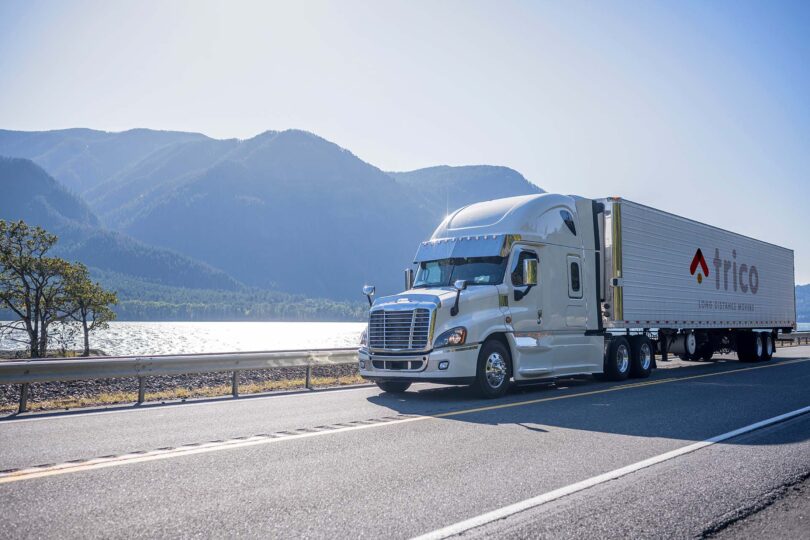As you prepare for your cross-country relocation, it’s important to be aware of the Federal Motor Carrier Safety Administration regulations that govern the transportation of goods and the qualifications of drivers and carriers. Understanding their role in ensuring safety is crucial for a successful and safe move – and we can help you do just that. In this blog post, we’ll provide an overview of the FMCSA and all information helpful for those who wish to relocate stress-free.


The US Department Of Transportation Federal Motor Carrier Safety Administration (FMCSA) is a government agency that is responsible for regulating and enforcing safety regulations for commercial motor vehicles (CMVs), including those operated by long-distance movers. The FMCSA sets safety requirements for CMVs, including rules for driver qualifications, hours of service, and vehicle maintenance. The agency also mandates drug and alcohol testing for commercial drivers and conducts compliance reviews to ensure that motor carriers and drivers are following safety regulations.

The FMCSA regulations and requirements are rules that drivers, carriers, and motor carriers must follow to ensure the safe operation of commercial motor vehicles. Learning more about them must be on your relocation to-do list – and we are here to give you some examples:
These are just a few examples of the FMCSA regulations and requirements. The agency has many other rules in place to promote the safe operation of commercial motor vehicles and reduce the safety risks on the nation’s highways.
The safety requirements for commercial motor vehicles (CMVs) are set by the FMCSA and are designed to promote safe operation and reduce the risk of crashes, injuries, and fatalities. These requirements include all of the rules mentioned above regarding driver qualifications, hours of service, vehicle maintenance, and so on. By following these safety requirements, motor carriers can help ensure that their vehicles are operated safely and that their drivers are qualified and properly trained to operate them.
The Federal Motor Carrier Safety Administration (FMCSA) National Registry offers a variety of programs and services aimed at improving safety – all of which can help you reduce the relocation stress when organizing a move to a new home. When you wish to ship your belongings to another state, take a look at some of the key programs and services offered:
This program is designed to identify and intervene with high-risk carriers and drivers. The program uses data analysis to measure carriers’ safety performance and drivers’ compliance with regulations to identify areas for improvement. Carriers with poor safety scores may receive interventions, such as warning letters, fines, or even a revocation of their operating authority.
The SMS is a tool used by the FMCSA to prioritize interventions and identify carriers that pose a safety risk. The system uses data from roadside inspections, crashes, and investigations to measure carriers’ safety performance in seven categories. Carriers with high scores in any category may receive interventions to improve their safety performance.
The New Entrant Program helps new carriers comply with safety regulations and ensure that their drivers are properly qualified and trained. Carriers must pass a safety audit within 18 months of receiving their operating authority, and the FMCSA provides resources and guidance to help them meet safety requirements.
The CDL Program sets standards for commercial driver’s licenses (CDLs) and ensures that drivers are properly trained and licensed. The program sets minimum age and experience requirements, as well as testing and medical standards, to ensure that drivers are qualified to operate CMVs.
The FMCSA mandates drug and alcohol testing for commercial drivers to prevent impaired driving. The program includes pre-employment, random, and post-accident testing, and carriers must maintain a drug and alcohol testing program that complies with FMCSA regulations.
The FMCSA has had a significant impact on transportation safety by regulating and enforcing safety standards for commercial motor vehicles. The before-mentioned agency’s rules and programs have helped reduce driver fatigue and impairment, prevent crashes, and improve safety on the nation’s highways. By promoting compliance with safety regulations and encouraging safe driving practices, the FMCSA has contributed to a reduction in crashes involving commercial motor vehicles.

The FMCSA regulates the transportation of household goods (HHG) across state lines, which you can opt for when relocating to a new city or even if you plan a cross-country office move. A long-distance moving company that provides HHG transportation services is considered a motor carrier and is subject to FMCSA regulations.
If you plan on getting long-distance moving services during your relocation day preparations, it’s useful to know some ways in which the FMCSA affects cross-country moving companies.
First of all, if they want to provide relocation and packing services, cross-country movers must obtain operating authority from the FMCSA to legally operate as motor carriers. Remember – the company’s license and insurance is the first thing you need to look into when checking if the company is legitimate. Additionally, when relocating to a new city alone or with family, keep in mind that the FMCSA sets safety regulations we discussed earlier for all licensed relocation companies.
When organizing a move across the country and choosing a relocation company to help you move efficiently, it’s also important to know that the FMCSA also conducts compliance reviews to ensure that they are following safety regulations. This agency also offers a dispute resolution program for consumers who have complaints against cross-country moving companies. The program helps resolve disputes related to the loss or damage of relocation inventory during transportation.
Relocation companies that transport household goods cross-country are subject to FMCSA regulations. If you’re planning a move to another city and want to hire a company that provides cross-country moving services, it must comply with FMCSA rules and regulations.
However, companies that only provide intrastate moving services, meaning they operate within the same state, may be exempt from some FMCSA regulations. The specific requirements and exemptions can vary by state, so relocation companies, as well as those people planning to relocate, need to check with their state’s transportation department.

FMCSA regulations are designed to ensure the safety of commercial motor vehicles and the goods they transport, as well as to protect consumers from relocation scams. Moving companies that comply with FMCSA regulations are more likely to have safe, well-maintained vehicles, qualified and trained drivers, and appropriate insurance coverage that will help you make your move easier.
Therefore, when googling the best long-distance moving company near me to find a reliable relocation company, you should go only with a mover that complies with FMCSA regulations, such as Trico Long Distance Movers. With us, you can avoid penalties, delays, and additional costs and have peace of mind knowing you’ll be able to move safely and efficiently. If you need to book your relocation, don’t wait any longer – contact us and secure a stress-free move.
The FMCSA regulates commercial motor vehicles (CMVs), which include trucks, buses, and other vehicles used for commercial purposes. The agency oversees the safety of vehicles with a gross vehicle weight rating (GVWR) of over 10,000 pounds, as well as vehicles that transport hazardous materials.
The FMCSA sets safety requirements for CMVs, which include rules for vehicle maintenance, driver qualifications, hours of service, and cargo securement. The agency also mandates drug and alcohol testing for commercial drivers and requires electronic logging devices (ELDs) to be installed in CMVs to track drivers’ hours of service.
The FMCSA conducts compliance reviews to ensure that motor carriers and drivers are following safety regulations. Non-compliance can result in enforcement actions, including fines, penalties, and the revocation of operating authority.
Penalties for non-compliance with FMCSA regulations can range from fines to the suspension or revocation of operating authority. Violations of drug and alcohol testing regulations can result in driver disqualification and fines for the employer.
The FMCSA requires motor carriers to implement drug and alcohol testing programs for their drivers. The agency also conducts random testing of drivers and investigates reports of drug and alcohol violations.
The FMCSA offers various programs and initiatives to improve safety, including the Compliance, Safety, and Accountability (CSA) program, which identifies high-risk carriers and drivers. The agency also provides education and outreach to the industry to promote safe driving practices.
The FMCSA works with other federal and state agencies, as well as industry stakeholders, to improve transportation safety. The agency collaborates with the National Highway Traffic Safety Administration (NHTSA), the Occupational Safety and Health Administration (OSHA), and other organizations to promote safe driving practices.
The FMCSA uses technology to improve safety, including electronic logging devices (ELDs) to track drivers’ hours of service, as well as other systems for monitoring driver behavior and vehicle maintenance.
The FMCSA is constantly reviewing and updating its regulations and requirements to improve safety. In the future, we can expect changes to hours of service rules, as well as new technology and programs aimed at improving safety on the nation’s highways.
The District of Columbia Department of Motor Vehicles (DC DMV) is not part of the Federal Motor Carrier Safety Administration. The DC DMV is the agency responsible for regulating driver licenses, vehicle registration, and other related matters in the District of Columbia. It is a state-level agency, and it operates independently of the federal government. The FMCSA, on the other hand, is a federal agency that is responsible for regulating commercial motor vehicles and drivers across the United States.